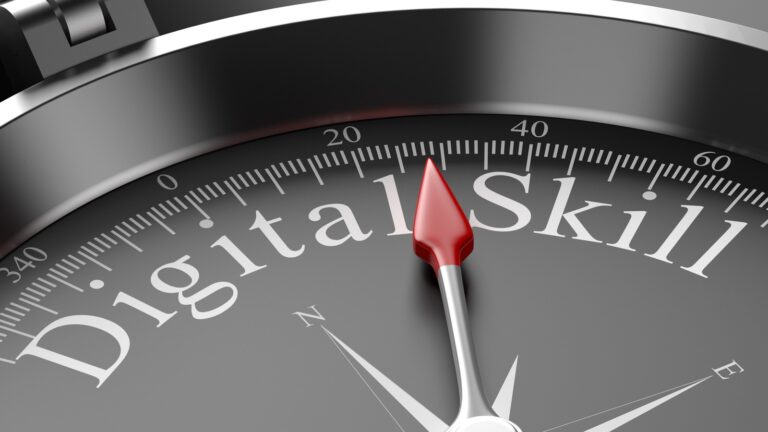As the world is increasingly getting digitally advanced, knowing digital tools and technologies is no longer an aspect or requirement restricted to those in a specific industry. The rise of the digital world is a wake-up call for everyone to start working on their soft skills, explicitly gaining digital knowledge and skills. What this means is not for everyone to know technical concepts or jargon. Instead, a person today must have the skills of a tech-savvy person. Can you use everyday apps with no problem? Do you feel comfortable using apps on your mobile phone or website? This article will list a series of digital skills even the most mundane person should know in 2023.
At Every Point in Time, Digital Skills Have Been Relevant
At any point in the 20th or 21st century, if someone was to look for a place of employment via the web or a newspaper, the importance of digital skills is often highlighted. The most common digital skill one may often come across, even today, is familiarity with Microsoft software packages, for instance. The need to include this in job adverts indicates that only some have the necessary skills and knowledge to use the software features effectively. Applications such as Microsoft word, excel and presentation are not just used in the corporate world but are also depended on by students in school and university. How one can operate and send off emails are other digital skills that have long been relevant.
Eight Skills to Learn in 2023

In an OECD report in 2016 that surveyed Adult Skills, it was found that only 50 per cent of the adult population in 28 OECD countries could carry out the most basic tasks, such as writing an email and browsing the web. Others barely have any ICT skills at all. The report also found that even in companies that require people to use software for work daily, an average of over 40 per cent do not have the skills required to use digital technologies effectively. In the corporate world, since work transitioned to a remote setting after COVID-19, businesses have recognised the importance of upskilling their employees. Hence, according to a survey, 84 per cent of companies believe that workers should be sent for training to become resilient. Consequently, organisations worldwide started investing significantly in digital skill training. Here are some digital skills everyone should have in 2023:
The Basics - Microsoft, G-Suite
As previously stated, the relevance of software applications like Microsoft has been long-standing. Companies and students use it to do reports and assignments, submit proposals, do presentations, make business accounts and sales, and use it for other administrative purposes. Being digitally skilled in such software does not mean it is sufficient for a person to open the application and start typing simply. It means being aware of all the features and using them to ensure your content is perfect. This could be in terms of design, transition, readability and more. Converting documents to PDFs and encrypting files are other essential digital skills a person should have today. Being aware of software that can detect plagiarism and looking into your grammar and related applications are also helpful to maximise productivity in fields like copywriting.
Graphic design, Audio and Video Editing
An entire industry specialises in graphic designing and audio and video editing. Today, there are additionally multiple qualifications in these areas, training professionals to use suites like Adobe, CorelDraw and others whilst also providing a range of specialised licenses that proves to an employer you have such skills. However, in today’s day and age, there are many simple applications where you can do such things. One of the most popular platforms for this purpose is Canva, allowing users to easily make a quick social media post, story template, or creative video. While those in the film or entertainment industry require a higher calibre of technological knowledge, those in fields like marketing, for instance, can fully equip themselves with digital skills related to designing and editing. This can even be done through a smartphone.
Communication Tools
One of the most incredible things technology introduced was the ease of communication. Hence, familiarising oneself with all the different ways communication can take place is helpful. This includes being able to use your social media channels well. Being aware of how the younger generation communicates is part of being digitally literate. Hence, knowing how to host live stories and Twitter spaces and making use of hashtags, reels, and other new technological features is essential. This is especially true in the marketing field. This also extends to being familiar with video conferencing platforms professionals and students use. Teachers, for example, need the knowledge to conduct a lesson on a virtual platform. Hosting webinars, creating teams, using the whiteboard for interactive learning, and using features such as break-out rooms are some digital skills everyone should have in the post-COVID world.
Typing Speed
The faster you can type, the higher your chance of standing out among your colleagues. At a time when all companies resort to a computer or laptop to do work, typing has become essential. Being a fast typer is a crucial advantage in writing content or even coding. It demonstrates that you have familiarised yourself with the keyboard structure, leading you to type even without looking at it. For instance, schools that had to adopt online examinations found it extremely difficult to accommodate handwritten submissions, preferring them to be typed out. Since typed submissions eliminate illegibility issues in handwriting, this proved very effective for examiners. However, from a student’s point of view, timed assessments were an additional stress-inducing factor on top of the usual anxiety during the exam period due to the lack of practice in typing.
Online Banking and Shopping
Financial transactions on the internet have made life easy, although it has also raised certain concerns. While online banking is a more sustainably friendly option for the environment, with the surge of online shopping, the public must be mindful when purchasing. This includes shopping on websites like Amazon, eBay, and related apps. Ensuring the website one enters and completes a transaction is safe is part of being digitally skilled. Knowing what kind of password is the most secure, taking note not to share sensitive information via the internet, and using a safe connection should be commonsensical knowledge. Additionally, being aware of the danger of making transactions using a public connection or whilst your VPN is switched on is another vital point relevant to being digitally aware when making safe financial transactions in online shopping.
Online Privacy and Security
While the internet has helped the world to be one global community, allowing one to communicate with another based in a different location in seconds has increased the chances of a person’s privacy or security being breached. Hence, investing in a trusted virus guard and knowing not to click unknown links are essential. Also, enabling two-factor authentication tools, a feature not everyone remembers to activate, can help you protect your account from unknown devices trying to log in. Simple acts like safeguarding your phone with a screen lock or an app lock for sensitive documents are also important. This highlights the importance of being aware of the platforms you use. Even widely used search engines like Google have records of privacy and security breaches. Hence, making an informed choice to use safer search engines like DuckDuckGo or turning on the private browsing feature would go a long way.
Researching Online
Research is an integral part of any level. It can be termed as a digital skill because researching online is completely different from hitting the books in the library. For example, anyone that goes to the library can mostly rely on the sources used for research purposes. In an online environment, however, the amount of information available is enormous, making it hard to assess which is the most accurate and worthy of citing. Note that how you conduct your research depends on what you type in the search bar. The way you type it presents search results most relevant to your research. Hence, having the digital skill to easily find the most resourceful articles can save time when writing a well-researched piece. Google Scholar is one example which directly provides sources attributable to an academic publication.
WordPress
Whether you are part of a company, running a blog page for a club or society in your university or is a freelancer, it is common to invest in a good website to promote your brand. At one point in time, websites could only be handled and developed by a professional coder. However, various platforms offer ready-made templates, allowing any person who is tech savvy to purchase it and customise it according to their needs conveniently. Hence, feeling comfortable enough to handle such platforms demonstrate the number of digital skills you have. While generally, such platforms do not require you to code anything, there is no harm in learning a few coding techniques. This helps you to add additional features that do not have an easier way of integrating a unique feature on your website.
Stand Out As A Digitally Skilled Individual
In a world where digital skills are becoming more and more relevant, increase your chances of employability by familiarising yourself and becoming tech-savvy. Those with core digital skills can easily adapt to any software platform their prospective empower uses and catch up with the demands requested. Finish your tasks more efficiently, smartly and intelligently by being a well-rounded professional.






